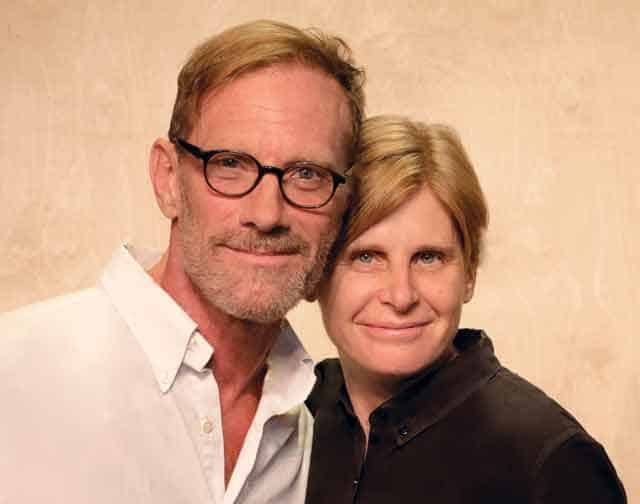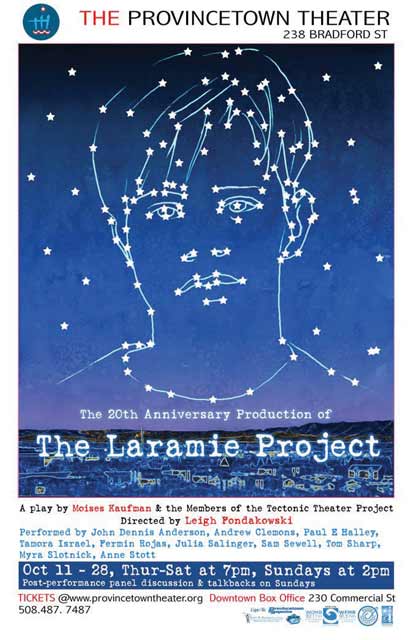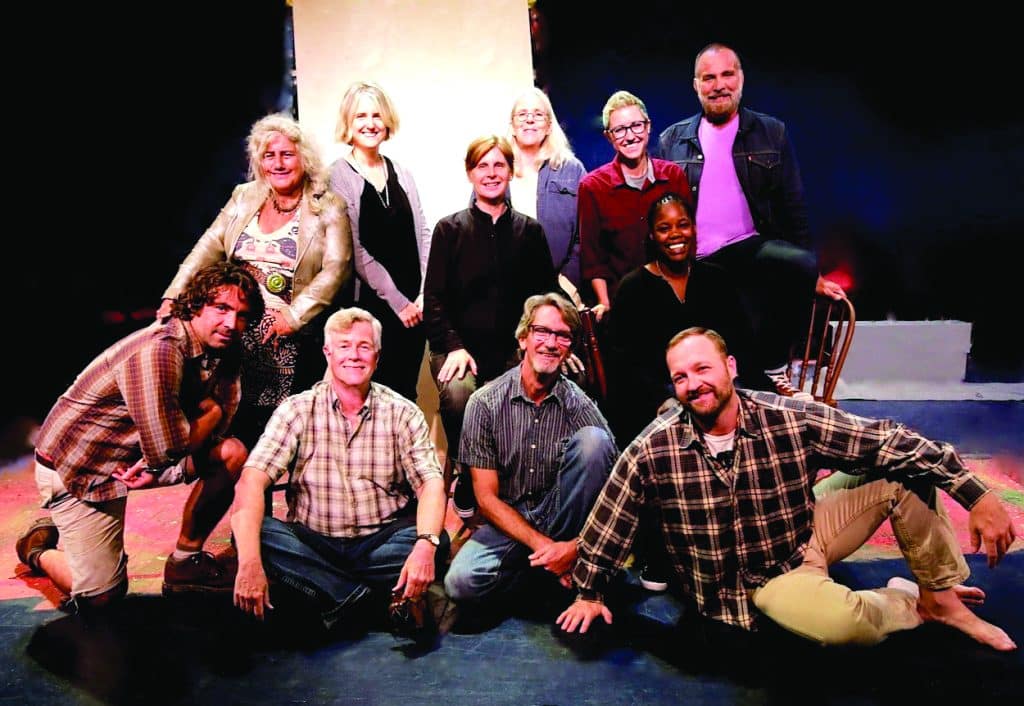The Provincetown cast of The Laramie Project gathered around Fondakowski
by Steve Desroches
When Matthew Shepard was murdered in October of 1998 so began a national conversation the likes of which had never happened before. It wasn’t just the brutality of the crimes committed by Aaron McKinney and Russell Henderson, who beat and tortured the 21-year-old student at the University of Wyoming and then left him tied to a fence. Shepard would die from his injuries six days later. The country took a long hard look at violence against LGBT people, as well as hate crimes in general, as the media explored the role Shepard’s sexuality played in the motivation of those who killed him.
Shepard’s murder forced America to examine the culture that contributed to such a horrible crime, especially the treatment of LGBT people. But the introspection that began 20 years ago was perhaps most intense where the crime happened, in the small university town of Laramie, Wyoming. And just three weeks after his death a team from the Tectonic Theater Project in New York traveled to Laramie to interview the town’s inhabitants about their view of the murder, its aftermath, and its effect on this tight-knit community. The hundreds of hours of interviews became The Laramie Project, a celebrated play about the town’s reaction to Shepard’s murder that is coming to the Provincetown Theater this month opening the day before the 20th anniversary of Shepard’s death.

Written by Moisés Kaufman, this production at the Provincetown Theater is directed by Leigh Fondakowski, who was the head writer for the team that went to Laramie and a member of the Tectonic Theater Project that was involved in the development of The Laramie Project since its conception. For her, the text of the play not only reminds her of the events depicted within, but also of the emotional process of creating the piece as a collaborative process. She remembers the lengthy discussions, each of her colleagues imprints into the final work, and the emotional commitment made by each of them. She also recalls how the Tectonic Theater Project went from a struggling small troupe to being able to stage landmark productions with a little help from Oscar Wilde. It was the theater company’s hit off-Broadway production of Kaufman’s Gross Indecency: The Three Trials of Oscar Wilde that put them in the black for the first time in their history, giving them the funds to travel to Laramie.
“I always found it kind of poetic that Oscar Wilde helped fund The Laramie Project,” says Fondakowski. “It’s like he came back from the dead to help us.”
While much has changed since 1998 in regards to LGBT rights, a lot hasn’t, says Fondakowski, especially when it comes to the threat of violence. And while two decades have passed, the story of Matthew Shepard continues to resonate, as is evident in that The Laramie Project is still performed all over the world and even generated a sequel with The Laramie Project: Ten Years Later, as well as a 2002 HBO film. It thrives perhaps because of the universal theme of a community examining itself to try and find answers. Not just how and why, but the harder questions of was this hate always present and why did it go unrecognized and unchallenged?
When she went in 1998, Fondakowski found Laramie a pleasant, and surprisingly liberal place that felt it had been portrayed inaccurately in the days and weeks after Shepard’s murder. Years later, it still grapples with having a name synonymous with such an awful event, like Jasper, Texas, the town where in 1998 three white supremacists killed James Byrd, Jr., a black man, who along with Shepard would be the namesake for the federal hate crimes bill passed and signed into law by President Barack Obama in 2009.

After a successful summer run of Terrence McNally’s Love! Valour! Compassion! Drake is thrilled that Fondakowski reached out, as the Provincetown Theater is the perfect stage to reexamine these works that, while rooted in a specific time and place, are proving to be timeless. “We’re at a time where Love! Valour! Compassion! and The Laramie Project are no longer gay plays, and they’re not new anymore,” says Drake. “They’ve entered the canon of modern American classics.”
For many, the events in Laramie 20 years ago still feel fresh. It’s hard to conceive how much time has passed and that, if he were alive today, Matthew Shepard would be 41. The story told in The Laramie Project can conjure a variety of feelings for those who have experienced hate and violence themselves or struggle with anger and resentment at continued discrimination against LGBT people. To further explore the themes within the play and to continue the conversation started in 1998, there will be a panel discussion featuring different special guests each week and audience talkbacks after each Sunday matinee.
Answers may still be hard to come by, but even all these years later, both Drake and Fondakowski say The Laramie Project continues to vibrate with relevancy.
“I’ve been living with this play for twenty years and it still surprises me,” says Fondakowski. “It can still really surprise me.”
The Laramie Project is at the Provincetown Theater, 238 Bradford St., Thursday through Saturday at 7 p.m. and Sundays at 2 p.m. now through October 28. For tickets ($35) and information, go to the theater’s box office, call 508.487.7487, ext. 1, or visit provincetowntheater.org.











